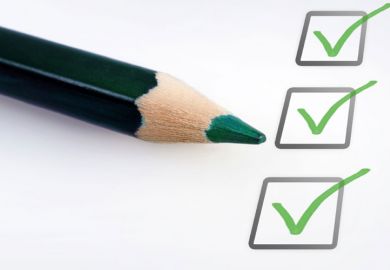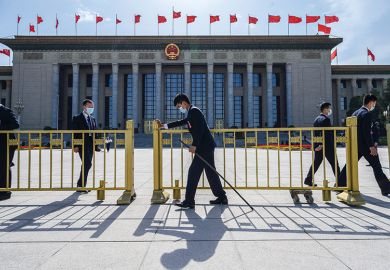Browse the full Asia University Rankings 2023 results
Yuehong (Helen) Zhang, who has been tracking developments in scholarly ethics for 15 years, published a study in 2021 exploring various indicators of academic integrity across continents. One key indicator was affiliation with the Committee on Publication Ethics (Cope), which advocates for high publication standards. Her study found that Europe had the highest rate of Cope membership (which includes organisations and individuals), followed by North America, Asia, Oceania, Africa and finally South America.
In terms of academic integrity, Asia has made vast improvements in recent years but still has a way to go, says Zhang, author of Against Plagiarism: A Guide for Editors and Authors and former chief editor of the Journal of Zhejiang University-SCIENCE and managing editor of Bio-Design and Manufacturing.
Within Asia, the countries with the highest awareness of academic integrity are China and Japan, followed by India, Zhang found. “The consciousness level of research integrity is closely related to economic and technological development,” she says.
More than a decade ago, in 2010, Zhang investigated the websites of China’s top universities to see which had publicly available research integrity guidelines and information. “The results were not optimistic,” she says (though there were exceptions, such as Zhejiang University). Today, however, the picture is markedly different. Chinese universities have online guidelines, as well as modules on academic integrity and publication ethics incorporated into the curriculum for graduate students. In 2022, she personally taught 26 hours of classes on publication ethics for postgraduates and research authors in universities and institutes.
“Frankly speaking, over the past decade, I have felt that Asia, especially China, attaches as much importance to research integrity as the United Kingdom and the United States,” Zhang says.
But there is still a way to go, she believes, citing research by Yandong Zhao, a peer at Renmin University of China, that found that while the proportion of Chinese science and technology academics with a solid understanding of research norms has risen, so has the proportion who were not at all familiar with research norms (the middle group, “somewhat familiar”, has shrunk).
Whenever a Chinese integrity issue comes to light and becomes an international story, Chinese university officials “will promptly issue documents or policies to solve [the problem] or severely punish [those guilty of misconduct]”, Zhang says. But what is really needed is a comprehensive approach.
Instead of treating each incident in isolation, “we need to create a transparency culture,” she says. “We will never completely eradicate misconduct…students cheating, paper mills, etc. However, we have to make it morally and culturally unacceptable.”
She adds: “We must create a strong, honest culture of research integrity. Break the cultural curse of ‘publish or perish’ and dare to admit failure.”
One of the solutions Zhang proposes is an Academic Integrity Awareness Index, which would cover several aspects including education, transparent policies and industry supervision. “It could be used to create cultural consciousness of research integrity as the bottom line in the academic world,” she says.
Register to continue
Why register?
- Registration is free and only takes a moment
- Once registered, you can read 3 articles a month
- Sign up for our newsletter
Subscribe
Or subscribe for unlimited access to:
- Unlimited access to news, views, insights & reviews
- Digital editions
- Digital access to THE’s university and college rankings analysis
Already registered or a current subscriber?




